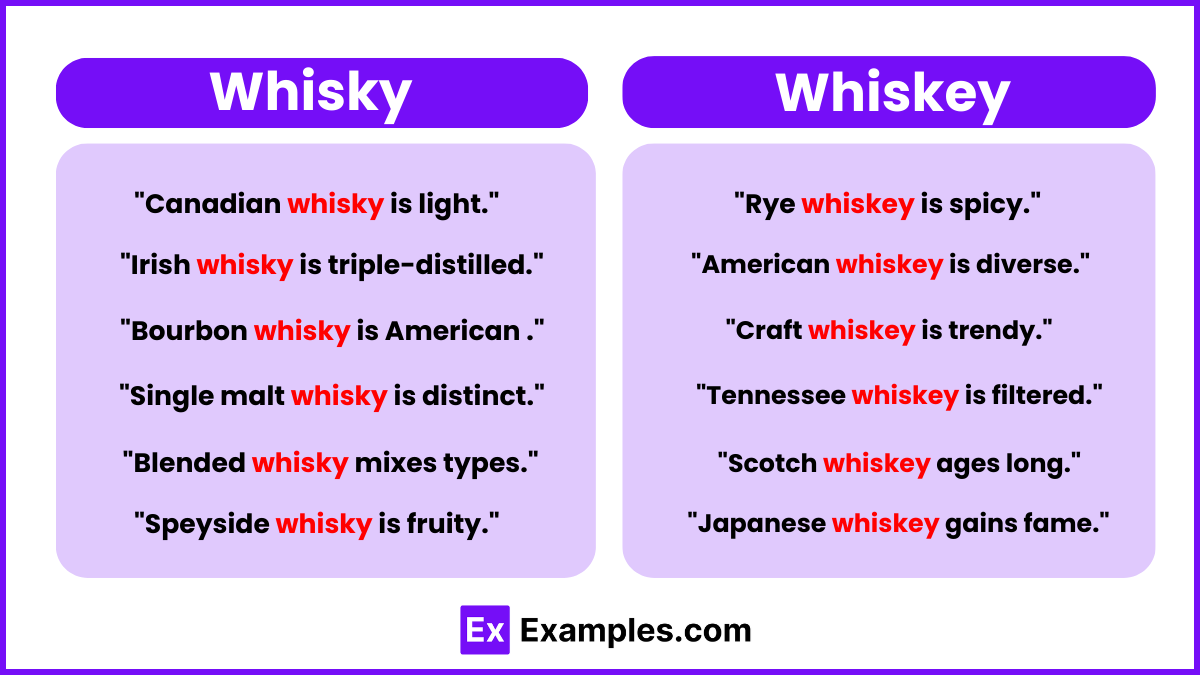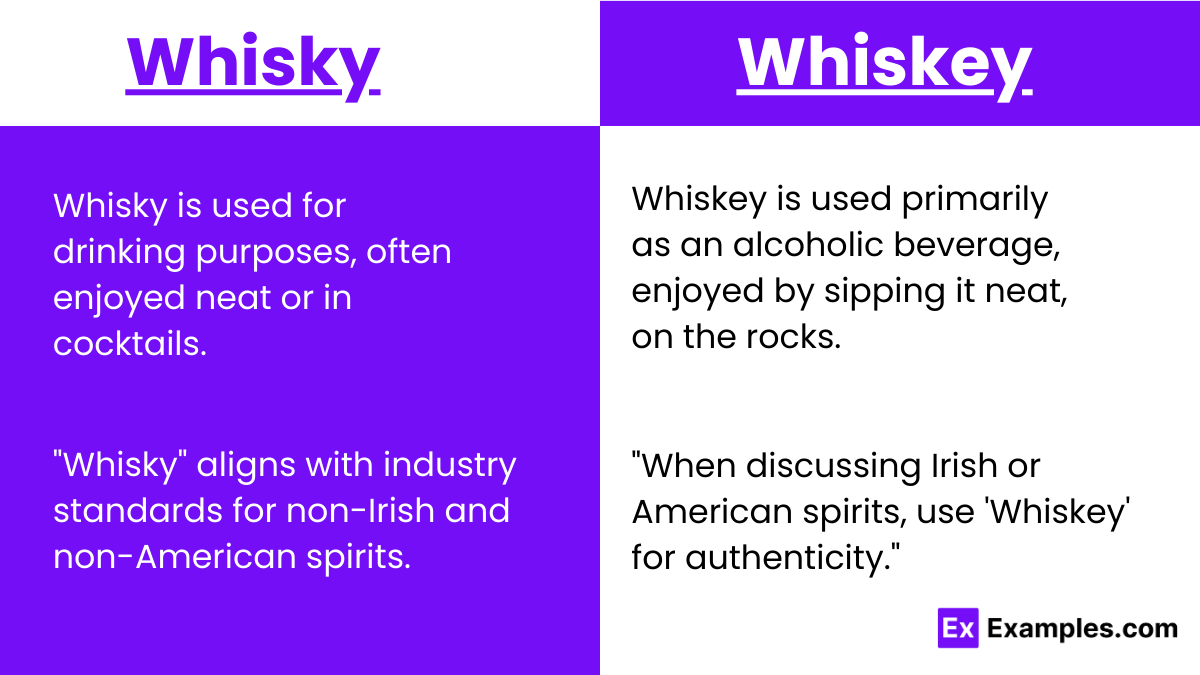Whisky vs Whiskey – Examples, Differences, Usage
In the realm of spirits, the debate between ‘Whisky’ and ‘Whiskey’ is more than a matter of spelling—it’s a gateway into a rich tapestry of cultural heritage and meticulous craftsmanship. These two terms, seemingly identical to the untrained eye, actually herald distinct traditions of distillation and storytelling that span continents. This article aims to shed light on the subtle yet significant distinctions that mark ‘Whisky’ from ‘Whiskey’, guiding enthusiasts and novices alike through the intricate dance of grain, water, and wood that defines these beloved beverages.
Understanding the difference begins with a journey through the rolling hills of Scotland and Ireland, the heartlands of these spirits, where history seeps into every barrel and recipe. While both ‘Whisky’ and ‘Whiskey’ whisper tales of age-old methods and ancestral lands, the variance in their nomenclature is a nod to the linguistic and procedural nuances that influence their creation. As we explore the essence of these spirits, students will gain not only a deeper appreciation for the craft behind each glass but also a linguistic insight that bridges language, geography, and the art of distillation.
Whisky and Whiskey – Meanings
Whisky: The term “Whisky” refers to a distilled alcoholic beverage made from fermented grain mash, which can include barley, corn, rye, and wheat. The spelling “Whisky” is traditionally used by countries without an “e” in their names, such as Scotland, Japan, and Canada. Scottish and Japanese whiskies are renowned for their meticulous distillation processes and diverse flavor profiles, ranging from peaty and smoky to light and floral.
Whiskey: “Whiskey” with an “e” denotes a spirit that shares the same basic production process as whisky but is associated with Ireland and the United States. This variation in spelling signals slight differences in production techniques and ingredients. Irish and American whiskeys are known for their distinctive characteristics; Irish whiskey is typically triple distilled for smoothness, while American whiskey, like bourbon, often has a sweeter profile due to the high corn content and specific aging requirements.
Summary
Whiskey, spelled with an ‘e’, encapsulates the grain-based spirits that hail from Ireland and the United States, each with its own unique production idiosyncrasies and flavor nuances. Conversely, ‘Whisky’, dropping the ‘e’, signifies the distilled beverages originating from Scotland, Canada, or Japan, renowned for their distinct distillation traditions and diverse taste profiles. This difference in spelling not only denotes geographical origins but also reflects the subtle variations in crafting these celebrated spirits.
Difference Between Whisky and Whiskey
Exploring the ‘Whisky vs Whiskey’ distinction reveals more than spelling differences; it’s a journey through cultural, historical, and procedural nuances.
| Aspect | Whisky | Whiskey |
|---|---|---|
| Origin | Scotland, Canada, Japan | Ireland, United States |
| Spelling Region | Countries without an “e” in their names | Countries with an “e” in their names |
| Ingredients | Barley, corn, rye, wheat | Barley, corn (predominantly for bourbon), rye |
| Distillation | Varies by country; often double distilled | Ireland: usually triple distilled, US: varies |
| Flavor Profile | Ranges from peaty/smoky to light/floral | Irish: smooth and light, American: often sweeter |
| Aging Process | Minimum three years in wood barrels | Varies by type; bourbon requires new oak barrels |
| Regulations | Strict geographic and production regulations | Specific rules depending on the type (e.g., bourbon) |
| Cultural Significance | Deeply rooted in national heritage | Integral to cultural identity and history |
| Production Techniques | Distinct techniques like peat drying in Scotland | Unique processes like sour mash in the US |
| Global Recognition | Renowned worldwide for quality and diversity | Celebrated for distinctive styles and innovation. |
Examples of Whisky and Whiskey
Whisky and Whiskey are both popular examples of alcoholic beverages, but the spelling differs based on geographical origin. Whisky is typically associated with Scotch whisky from Scotland, while whiskey is commonly linked to Irish and American varieties
Examples of Whisky:
- The Glenlivet, a Scotch Whisky, is known for its smooth and floral notes, making it a favorite among enthusiasts.
- Suntory Yamazaki, a Japanese Whisky, offers a harmonious blend of sweet and woody flavors, reflecting the precision of Japanese craftsmanship.
- Canadian Club, hailing from Canada, is a Whisky that boasts a light and smooth profile, ideal for cocktails.
- Talisker, a single malt Scotch Whisky from the Isle of Skye, is celebrated for its peaty character and complex taste.
- Nikka from the Barrel, a Japanese Whisky, is acclaimed for its rich, full flavors and impeccable balance, a testament to the art of blending.
Examples of Whiskey:
- Jameson, an Irish Whiskey, is renowned for its triple-distilled smoothness and versatile flavor profile.
- Jack Daniel’s, a classic American Whiskey, is beloved for its distinctive charcoal-mellowed sweetness.
- Bushmills Black Bush, an Irish Whiskey, combines a high amount of malt whiskey matured in former Oloroso Sherry casks, offering rich, fruity notes.
- Maker’s Mark, a smooth bourbon from the United States, is noted for Whiskey is a soft, sweet flavor, achieved through the use of red winter wheat.
- Bulleit Bourbon, an American Whiskey, is appreciated for its bold, spicy character, derived from a high rye content in the mash bill.
When to Use Whisky and Whiskey
Usage of “Whisky”
- Referring to Scottish, Canadian, or Japanese Spirits: Use “Whisky” when discussing spirits from these regions to honor their traditional spelling and production methods.
- Discussing Specific Types like Scotch or Single Malt: “Whisky” is the preferred term for specific categories originating from countries that spell it without the ‘e’.
- Engaging in Global or Professional Spirits Discussions: In international or professional contexts, especially concerning distillation or sales, “Whisky” aligns with industry standards for non-Irish and non-American spirits.
Usage of “Whiskey”
- Talking about Irish or American Spirits: Use “Whiskey” when referring to spirits from Ireland and the United States, reflecting their customary spelling.
- Discussing Varieties like Bourbon or Tennessee Whiskey: These are distinct American styles, and the use of “Whiskey” acknowledges their unique characteristics and heritage.
- In Cultural or Historical References: When your narrative involves the cultural or historical aspects of Irish or American spirits, “Whiskey” is the appropriate term to maintain authenticity.
FAQs
Why is Maker’s Mark Whisky Not Whiskey?
Maker’s Mark is labeled “Whisky” as a nod to the founder’s Scottish heritage, despite being an American brand. This unique spelling choice sets it apart in the bourbon category, highlighting its distinct identity and tradition in the crowded whiskey market.
Is Scotch Whisky or Whiskey?
Scotch is always referred to as “Whisky” without the ‘e.’ This spelling is consistent with Scottish tradition and is legally enforced under Scotch Whisky regulations, which define the standards for whisky production in Scotland.
Is It Whisky or Whiskey and Why It Matters?
“Whisky” refers to spirits from Scotland, Canada, and Japan, while “Whiskey” is used for Irish and American spirits. The distinction matters for cultural accuracy, respecting each region’s linguistic preferences and distilling traditions.
Which is the Healthiest Alcohol?
Moderation is key, but red wine is often cited as the healthiest alcohol choice due to its antioxidants, such as resveratrol, which may offer heart health benefits. However, individual health factors and consumption patterns should always be considered.





